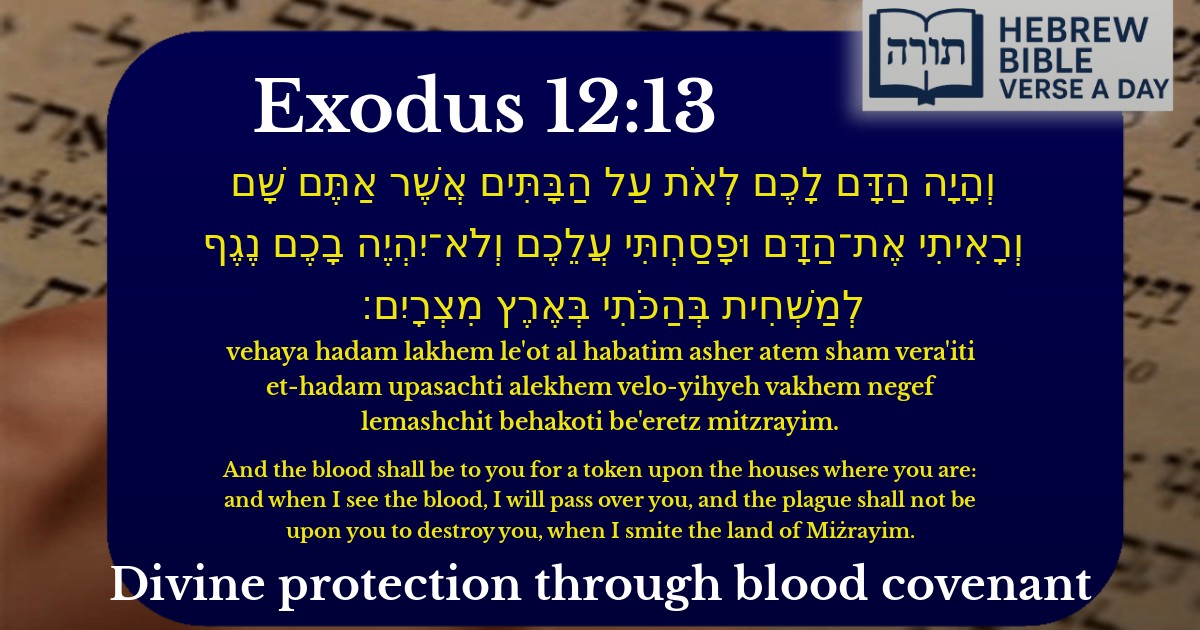Join Our Newsletter To Be Informed When New Videos Are Posted
Join the thousands of fellow Studends who rely on our videos to learn how to read the bible in Hebrew for free!
Hebrew Text
וְהָיָה הַדָּם לָכֶם לְאֹת עַל הַבָּתִּים אֲשֶׁר אַתֶּם שָׁם וְרָאִיתִי אֶת־הַדָּם וּפָסַחְתִּי עֲלֵכֶם וְלֹא־יִהְיֶה בָכֶם נֶגֶף לְמַשְׁחִית בְּהַכֹּתִי בְּאֶרֶץ מִצְרָיִם׃
English Translation
And the blood shall be to you for a token upon the houses where you are: and when I see the blood, I will pass over you, and the plague shall not be upon you to destroy you, when I smite the land of Miżrayim.
Transliteration
Vehaya hadam lakhem le'ot al habatim asher atem sham vera'iti et-hadam upasachti alekhem velo-yihyeh vakhem negef lemashchit behakoti be'eretz mitzrayim.
Hebrew Leining Text
וְהָיָה֩ הַדָּ֨ם לָכֶ֜ם לְאֹ֗ת עַ֤ל הַבָּתִּים֙ אֲשֶׁ֣ר אַתֶּ֣ם שָׁ֔ם וְרָאִ֙יתִי֙ אֶת־הַדָּ֔ם וּפָסַחְתִּ֖י עֲלֵכֶ֑ם וְלֹֽא־יִֽהְיֶ֨ה בָכֶ֥ם נֶ֙גֶף֙ לְמַשְׁחִ֔ית בְּהַכֹּתִ֖י בְּאֶ֥רֶץ מִצְרָֽיִם׃
וְהָיָה֩ הַדָּ֨ם לָכֶ֜ם לְאֹ֗ת עַ֤ל הַבָּתִּים֙ אֲשֶׁ֣ר אַתֶּ֣ם שָׁ֔ם וְרָאִ֙יתִי֙ אֶת־הַדָּ֔ם וּפָסַחְתִּ֖י עֲלֵכֶ֑ם וְלֹֽא־יִֽהְיֶ֨ה בָכֶ֥ם נֶ֙גֶף֙ לְמַשְׁחִ֔ית בְּהַכֹּתִ֖י בְּאֶ֥רֶץ מִצְרָֽיִם׃
🎵 Listen to leining
Parasha Commentary
📚 Talmud Citations
This verse is quoted in the Talmud.
📖 Pesachim 96a
The verse is discussed in the context of the Passover sacrifice and the significance of the blood as a sign for protection during the plague in Egypt.
📖 Mekhilta d'Rabbi Yishmael Bo, Parsha 7
The verse is cited in the Midrashic commentary on Exodus, discussing the details of the Passover observance and the protective power of the blood on the doorposts.


The Significance of the Blood as a Sign
The verse (Shemot 12:13) describes the blood of the Korban Pesach (Paschal lamb) as a protective sign for Bnei Yisrael during the plague of the firstborn. Rashi explains that the blood served as a siman (sign) to distinguish Jewish homes from Egyptian ones, ensuring that the plague would not affect them. The Midrash (Shemot Rabbah 17:3) elaborates that this act demonstrated the Jews' commitment to Hashem's commandments, as they risked Egyptian retaliation by publicly marking their doorposts.
The Meaning of "וּפָסַחְתִּי עֲלֵכֶם" (I Will Pass Over You)
The term pasachti (I will pass over) is interpreted in multiple ways by our Sages:
The Role of Human Effort and Divine Intervention
The Mechilta (Bo 11) highlights that the blood was not a magical charm but a demonstration of hishtadlut (human effort) coupled with emunah (faith). Bnei Yisrael had to actively apply the blood to their doorposts, showing their willingness to perform a mitzvah despite danger. Only then did Hashem intervene to protect them. This teaches that salvation requires both human action and divine assistance.
The Deeper Symbolism of the Blood
The blood represented two key ideas, as discussed in the Zohar (Bo 36a):
The Lesson for Future Generations
The Rambam (Hilchot Chametz U'Matzah 7:6) emphasizes that this event established the foundation of zechirat yetziat Mitzrayim (remembering the Exodus). The blood on the doorposts was not just a one-time act but a perpetual reminder of Hashem's deliverance, reinforcing the obligation to recount the story of Yetziat Mitzrayim for all generations.